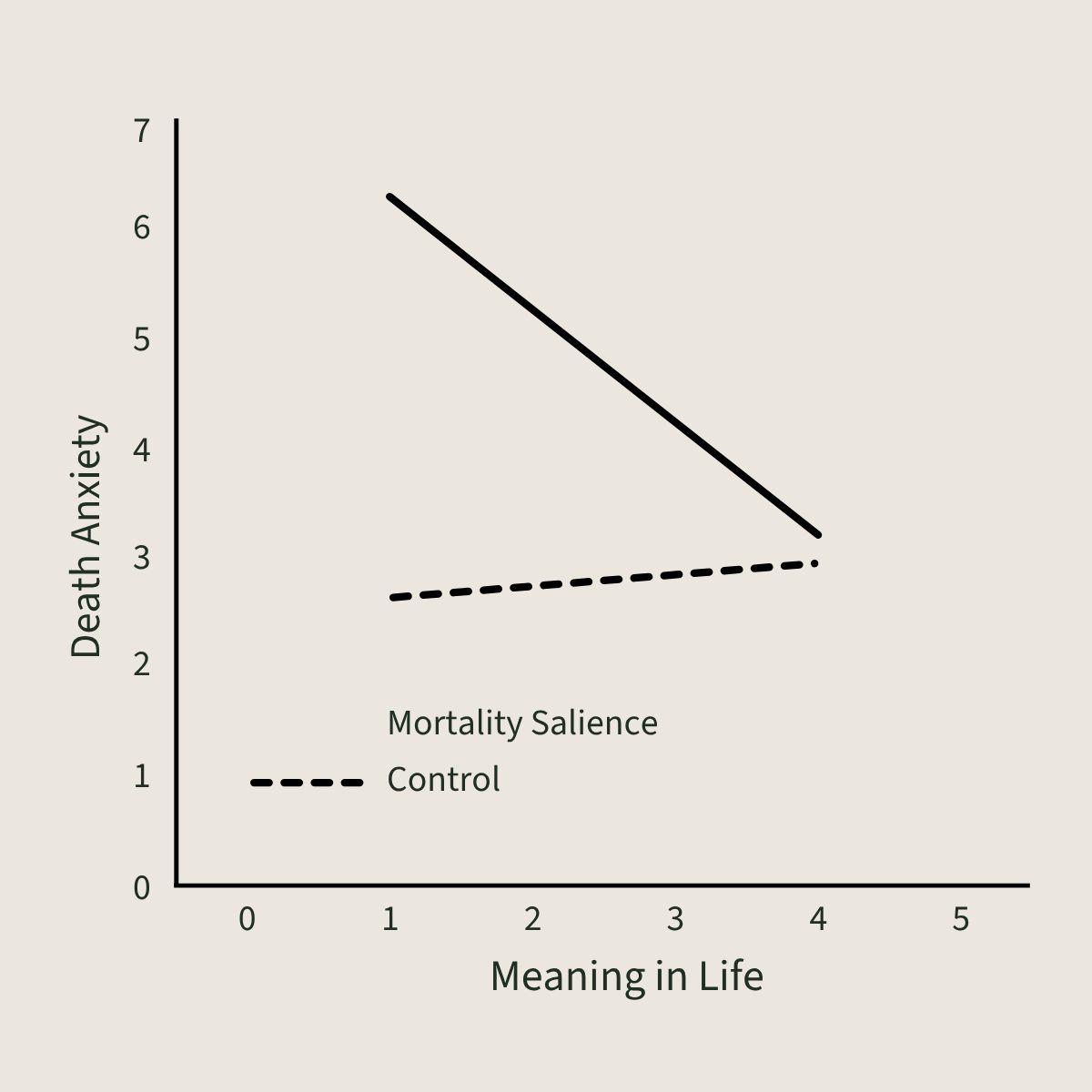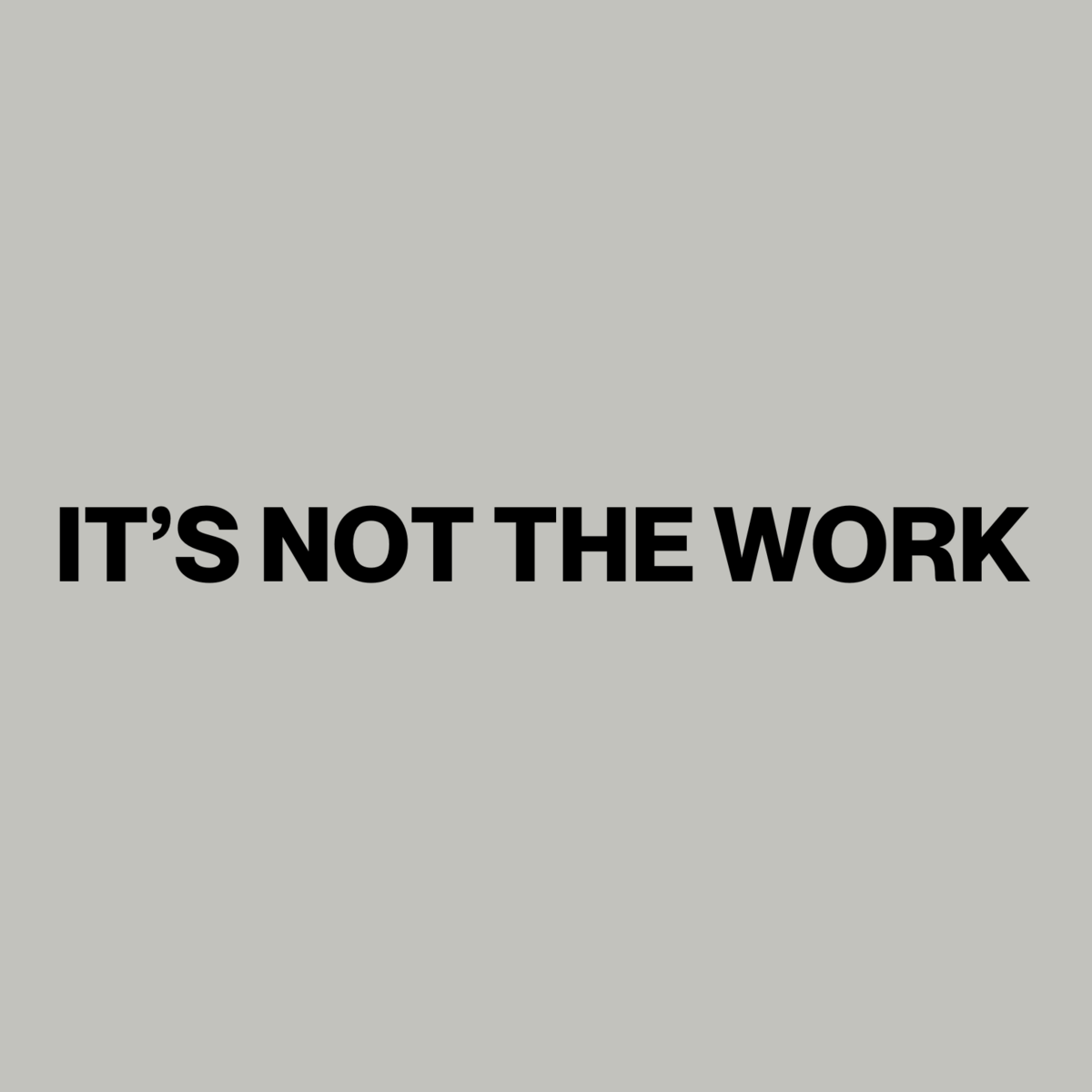You being here means more than you know. Knowing it lands with someone like you keeps me going. I'm Lavena Xu-Johnson. I write about psychology for founders. Why? Because scaling a business means scaling ourselves first.
Happy Wednesday, founders,
Some truths sit in the body before they form in words.
This one is a hard one to write. This ‘issue’ is not unique to founders; this is a human one, one we can never outwork.
It makes us switch sides at night, searching for a safer though. It waits at the threshold during the day, reminding us of its existence in big or small ways - a diagnosis, a loving one passing, a moment of existential crisis, a sad movie scene, or a genuine question from a child: ‘Where do we go when we're gone?’
We don’t always invite it in, but it enters our minds, steals our sleep, and sometimes acts as the driving force whether we like it or not.
One day, it gives us purpose, energy, and hope.
The next day, it takes away our purpose, energy, and hope.
The name is Death.
Death anxiety is strange because it shapes our choices while hiding in the costume of ordinary motives. Some of us face it directly, while others avoid it. Some of us wait for it without admitting it. Some dress it as ambition, productivity, and control. As Dr. Irvin D. Yalom writes in Staring at the Sun, “It’s not easy to live every moment wholly aware of death. It’s like trying to stare the sun in the face: you can stand only so much of it.”
Sometimes, this fear can slide into a flat, heavy nihilism. However, confronting our own fear can help it settle and soften.
This essay is not an argument against the void; it’s a way to embrace without losing ourselves. We’ll examine research, theory, and a few practices that help us find peace within.
🤝 This edition is kindly brought to you by Notion
We partner with a select group of brands that we use or admire, allowing this newsletter to remain free and independent. Reach out for your campaign here.
Thousands of startups use Notion as a connected workspace to create and share docs, take notes, manage projects, and organize knowledge—all in one place.
We partnered with Notion to give you up to 6 months free of new Plus plans, including unlimited Notion AI (up to 6,000$ in value)!
Terror Management Theory (TMT): how the mind braces against the abyss
Terror management theory (TMT) is a psychological paradox within us: the possession of a self-preservation instinct, and the knowing that death is inevitable and unpredictable. The tension is unbearable and produces terror, and we manage it through cultural beliefs, meaning, belonging, self-esteem, or religion.
TMT was developed by social psychologists Jeff Greenberg, Sheldon Solomon, and Tom Pyszczynski. It suggests that our mortality salience (i.e., awareness of our own mortality) is the driving force behind our prioritization of goals throughout adulthood. When mortality becomes salient, we instinctively cling to our worldviews more tightly and pursue symbols of significance.
1) Mortality salience and our ‘meaning’
Classic experiments show that reminders of death can harden our judgments and intensify our attachment to cherished values. A well-cited paper pushed this further - researchers found that a simple mortality prime increased death anxiety among people, but only for people with a lower sense of meaning-in-life. For those with a stronger sense of meaning, anxiety did not spike.
What it means: if we solidify our own meaning in life, it significantly reduces our terror. Meaning of life works like a psychological armor; it keeps mortality salience from tipping into panic.

Meaning in life & Death Anxiety: The effects of meaning in life and mortality salience on death anxiety: Higher scores reflect higher levels of death anxiety and meaning in life.
But what is the meaning of life?
When we say “meaning,” we’re not talking about a grand mission carved in stone.
It’s more of a felt sense that your life is coherent, connected, and consequential, that our days fit together, we belong with certain people, and what we do has meaning beyond ourselves.
Meaning shows up in small, sturdy places: keeping a promise, creating helpful work, tending a friendship, learning one true thing, being of service when no one is watching. It’s less a slogan and more a pattern of care.
We can practice by saying:
Coherence: my story makes enough sense to keep going.
Purpose: I’m moving toward something that matters to me.
Mattering: I matter to some people, and my actions leave a trace.
We build it by verbs, not trophies: listen, repair, create, include, and appreciate. That’s the meaning. It’s quiet, lively, and repeatable.
2) The strange double effect: Power and prosociality
This research has shown that mortality salience often prompts status-seeking, particularly in men, leading to increased interest in power and more assertive self-reports. At the same time, both men and women reported more prosocial behavior - people reach for significance through dominance and contribution.
What it means: Fear can push you to control, but it also has the same comforting impact when our goal is to serve.
When a death reminder collides with a fragile self-image (i.e., I’m more worthy when I win/achieve), the mind reduces cognitive dissonance by doubling down on judgments and conformity. If our identity is more expanded - our worth is not linked to outcomes, then there’s less cognitive dissonance to ‘burn off’, and less anxious compensating.
A personal note: My death anxiety sneaks in as a sense of urgency - I’m never happy with how fast I can cross the next milestone, as if the clock were hunting me. It shows up as extra hours, a racing mind at 2 a.m., and the feeling that if I slow down, I’ll lose my life’s plot. If you also catch yourself in this spiral, try asking: Is it about our goal, or are we trying to outrun our death anxiety?
Your turn: Where does yours show up? Is it speed, control, perfection, avoidance, or over-caring?
How to ease our death anxiety
1) Practice trait mindfulness
Trait mindfulness is our baseline tendency to notice present-moment experience with less judgment and reactivity. This is very different from a transient, mindful state that follows a meditation practice; it’s more like a tone your mind returns to.
Higher levels are linked to lower anxiety and depression through reduced worry and rumination and greater cognitive reappraisal. Trait mindfulness also relates to healthier behaviors, such as better sleep, physical activity, and a balanced diet, which support a steadier physiology and attention.
So, can mindfulness ease death anxiety?
Yes, indirectly, by reducing the need for harsh defenses when mortality is salient. Early studies even link specific facets (describing, non-judging) to lower death anxiety via cognitive flexibility. When we are less judgmental and more flexible, worldview threats don’t require as much compensatory grasping - in power, in perfectionism, or in control.
2) Name your meanings in life
Sit comfortably: Name out loud: “Life ends.”
Notice: Where is it in the body, throat, gut, or jaw? Place a hand there.
State: Name three meanings you’re living today that do not require active control: “build something useful,” “listen deeply and actively to others,” or “nurture relationships that matter”.
Non-judging: In our self-talk, replace ‘should’ with ‘noted’ or ‘noticed.’ This reduces dissonance spikes when our identity feels threatened.
3) Label, then practice the 4-7-8 breathing
When you notice urgency building up, say to yourself: “This is my fear and dread, taking action, living is about the moment now.” Labeling downshifts limbic arousal.
Close your eyes, slow inhale to a count of 4, hold for 7, exhale 8, until you feel slightly dizzy. Personally, I find the 4-7-8 breathing method is by far the most effective way to help me relax; it is also backed by research.
Key takeaways
Closing
We won’t defeat death, but we can hold our identity lighter, making our meaning in life and purpose to serve stronger. And when the tapping returns at 3 a.m., we can turn toward it and say: I hear you. Thank you for reminding me what matters.
How's the depth of today's edition?
As always, please hit reply if something in here resonates with you.
Until next week,
Lavena
P.S. If you want to get a founder feature about your own story, reply to this email. If you’d like to reach our newsletter audience (founders, creators, and marketers), click the button below.
If you’re new here, I’m over the moon you’ve joined us! To help me craft content that’s actually useful (and not just noise in your inbox), I’d love it if you took 1 minute to answer this quick survey below. Your insights help shape everything I write.
✨ Insane Media is more than one voice
Dive into our other newsletters - where psychology meets the creator economy, e-commerce marketing, and Human resources.







